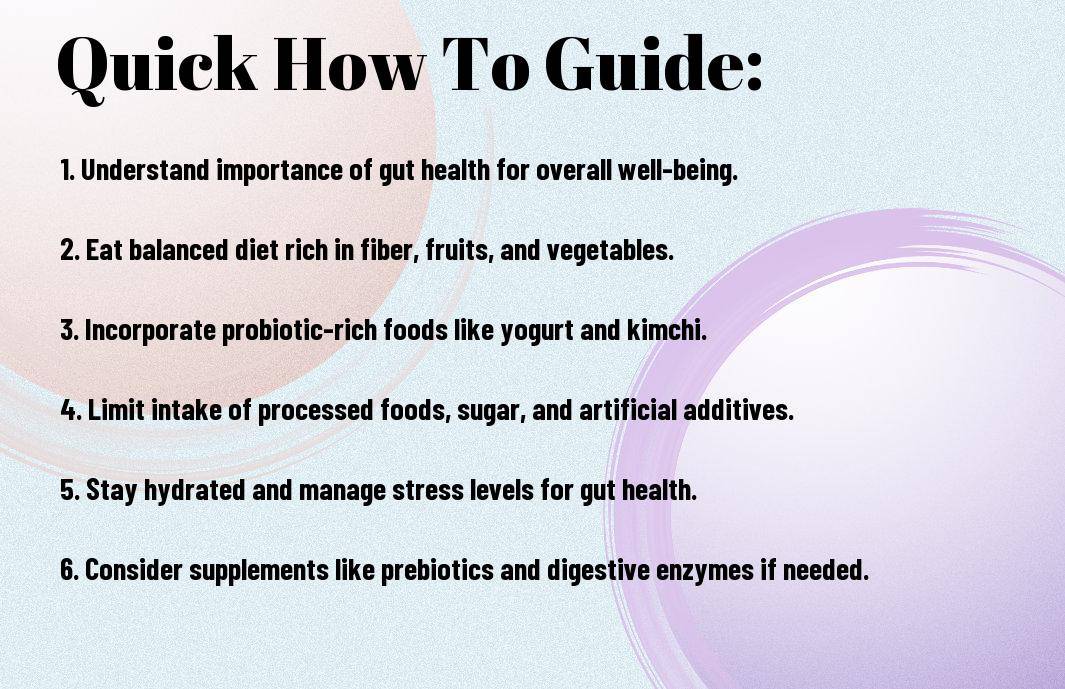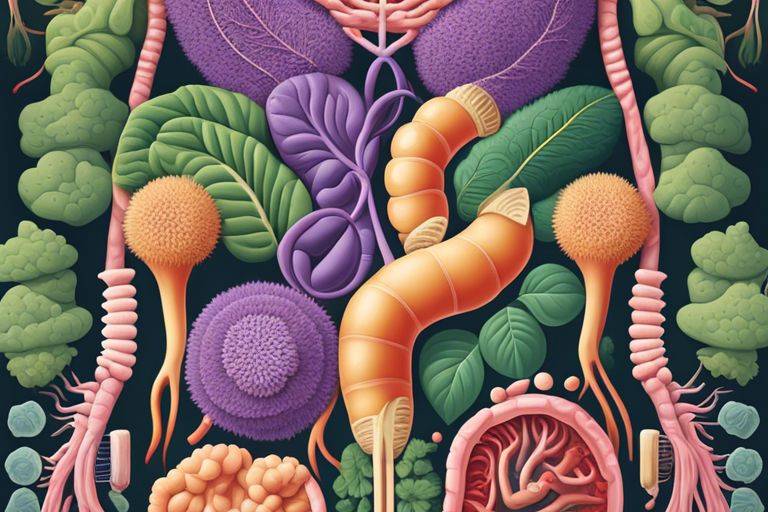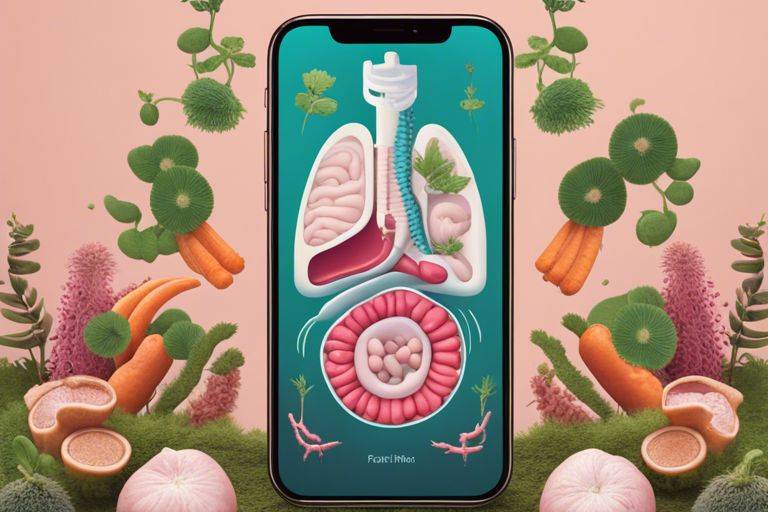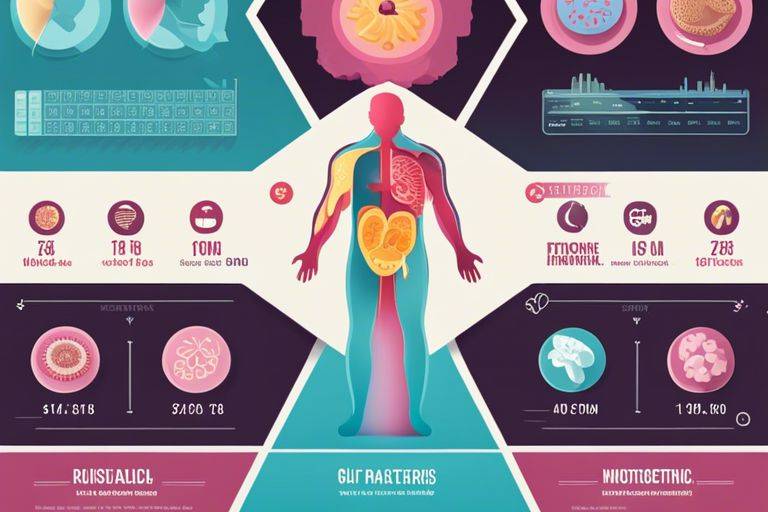Just imagine how vital your gut health is – it impacts your overall well-being, from digestion to immunity and even mental health. In this guide, I will walk you through why gut health matters and provide you with simple tips on how to improve it. Let’s take a explore the world of good bacteria, digestive balance, and the connection between what you eat and how you feel.
Key Takeaways:
- Gut health is crucial: A healthy gut plays a critical role in overall well-being and can affect various aspects of health, from digestion to immunity.
- Diet is key: Eating a balanced diet rich in fiber, prebiotics, and probiotics is crucial for maintaining a healthy gut microbiome.
- Reduce stress: Chronic stress can negatively impact gut health, so managing stress through mindfulness, exercise, and relaxation techniques is important.
- Stay hydrated: Drinking plenty of water can help maintain a healthy balance of good bacteria in the gut.
- Get enough sleep: Poor sleep habits can disrupt the gut microbiome, so aim for 7-9 hours of quality sleep each night.
- Avoid antibiotics when possible: Overuse of antibiotics can harm the gut microbiome, so only take them when absolutely necessary.
- Consult a healthcare professional: If you have persistent digestive issues or concerns about your gut health, seek advice from a healthcare provider or a registered dietitian.


Understanding Gut Health
What is Gut Health?
To understand gut health, you must first grasp the importance of your gastrointestinal system. It consists of a complex network of organs, bacteria, and enzymes working together to digest food, absorb nutrients, and eliminate waste efficiently. Gut health refers to the balance of microorganisms that reside in your digestive tract, impacting your overall well-being.
The Importance of Gut Health in Overall Well-being
Understanding the significance of gut health in your overall well-being is crucial. Your gut plays a vital role in various bodily functions, such as immune system regulation, hormone production, and even mental health. An imbalance in gut bacteria can lead to digestive issues, inflammation, weakened immunity, and other health problems.
For instance, an imbalance in gut bacteria can result in conditions like irritable bowel syndrome (IBS) or leaky gut syndrome. These conditions can manifest as digestive discomfort, nutrient malabsorption, and inflammation throughout the body, impacting your overall health.

Factors Affecting Gut Health
Now, let’s talk about the factors that can affect your gut health:
- Diet: What you eat plays a crucial role in the health of your gut.
- Lifestyle habits: Stress levels, sleep patterns, and exercise routines can impact your gut.
- Environmental toxins: Toxins in the environment can also have a negative effect on your gut health.
After addressing these factors, you can work towards improving your gut health.
Diet and Nutrition: How Food Choices Impact Gut Health
Health starts with the gut, and your food choices can significantly impact its well-being. Choosing a diet rich in fiber, fruits, vegetables, and probiotics can nourish your gut microbiome and support overall health.
Lifestyle Habits: Stress, Sleep, and Exercise
There’s more to gut health than just diet – your lifestyle habits also play a crucial role. Stress management, quality sleep, and regular exercise can all contribute to a healthy gut environment.
Diet, exercise, and stress levels can all affect the balance of bacteria in your gut. Incorporating exercise into your routine and finding ways to reduce stress can have a positive impact on your gut health.
Environmental Toxins and Gut Health
There’s a growing concern about how environmental toxins can harm our gut health. Exposure to pollutants, pesticides, and other chemicals in our surroundings can disrupt the delicate balance of our gut microbiome.
Another crucial point to consider is the impact of environmental toxins on gut health. Avoiding exposure to harmful chemicals and toxins can help protect and support the health of your gut microbiome.
Signs and Symptoms of Poor Gut Health
Digestive Issues: Bloating, Constipation, and Diarrhea
Many signs and symptoms can indicate poor gut health. To start, digestive issues like bloating, constipation, and diarrhea are common indications that your gut may not be functioning optimally.
Non-Digestive Issues: Fatigue, Skin Problems, and Mood Swings
Constipation, if left unchecked, can lead to non-digestive issues such as fatigue, skin problems, and mood swings. Issues like these can often be traced back to gut health and the balance of the microbiome in your digestive system.
When to Seek Medical Attention
There’s a time when I note that persistent or alarming symptoms should not be ignored. If you experience severe abdominal pain, unexplained weight loss, or persistent changes in bowel habits, it may be critical to seek medical attention promptly.
Mood swings, skin conditions, and unexplained fatigue could be signals of a more serious underlying condition related to your gut. It is important to seek professional advice if these symptoms persist despite dietary and lifestyle changes.
How to Improve Gut Health
All “Gut Health 101: Why Your Gastrointestinal Health Matters” and How to Improve It
Dietary Changes: Incorporating Gut-Friendly Foods
Even small changes in your diet can have a significant impact on your gut health. Incorporating more fiber-rich foods, like fruits, vegetables, and whole grains, can help promote a healthy gut microbiome and improve digestion. Additionally, fermented foods like yogurt, kimchi, and sauerkraut can introduce beneficial probiotics that support gut health.
Probiotics and Prebiotics: Understanding the Difference
Clearly understanding the difference between probiotics and prebiotics is crucial for optimizing your gut health. Probiotics are live bacteria that can provide health benefits when consumed in adequate amounts, while prebiotics are non-digestible fibers that feed the beneficial bacteria in your gut. Including both in your diet can help maintain a balanced and healthy gut microbiome.
Supplements and Vitamins for Gut Health
The key to improving your gut health is ensuring that you are getting an adequate intake of imperative nutrients like vitamin D, magnesium, and zinc. These nutrients play a crucial role in supporting gut function and maintaining a healthy gastrointestinal system. If you suspect you may have nutritional deficiencies, consult with a healthcare provider to determine the best supplementation plan tailored to your specific needs.

Tips for Maintaining a Healthy Gut
Despite our best efforts, maintaining a healthy gut can sometimes be a challenge. Here are some tips to help improve your gut health:
- Manage stress: Chronic stress can negatively impact your gut health. Find ways to reduce stress through mindfulness techniques such as meditation.
- Get enough sleep: Lack of sleep can disrupt the balance of bacteria in your gut. Aim for 7-9 hours of quality sleep each night to support a healthy gut.
- Stay hydrated: Dehydration can slow down digestion and affect the balance of good bacteria in your gut. Drink plenty of water throughout the day to stay hydrated and support your gut health.
Managing Stress Through Mindfulness and Meditation
Meditation is a powerful tool to help manage stress and promote a healthy gut. Taking a few minutes each day to practice mindfulness can help lower cortisol levels and reduce inflammation in the gut.
Getting Enough Sleep for Gut Health
An adequate amount of sleep is crucial for maintaining a healthy gut microbiome. Lack of sleep can lead to increased gut permeability, which may contribute to inflammation and digestive issues.
With busy schedules and constant distractions, it can be challenging to prioritize sleep. However, making sleep a priority is crucial for supporting your overall health and well-being.
Staying Hydrated and Avoiding Dehydration
Getting enough fluids is crucial for maintaining good gut health. Hydration helps keep the mucosal lining of the intestines intact and supports the balance of bacteria in the gut.
Health experts recommend drinking at least 8-10 cups of water a day to keep your body well hydrated and your gut functioning optimally.
Advanced Strategies for Optimal Gut Health
After covering the basics of gut health, let’s explore into some advanced strategies to optimize your digestive system. Here are some key tactics to consider:
- Fasting and Gut Health
- Gut-Friendly Herbs and Spices
- The Role of Fermented Foods in Gut Health
Fasting and Gut Health: Benefits and Risks
While intermittent fasting has gained popularity for its potential health benefits, it can also have an impact on your gut health. Fasting gives your digestive system a break and allows it to repair and rejuvenate. However, prolonged fasting can disrupt the balance of gut bacteria and lead to nutrient deficiencies. It’s crucial to approach fasting cautiously and consult with a healthcare provider before making significant changes to your eating patterns.
Gut-Friendly Herbs and Spices
With the right herbs and spices, you can enhance both the flavor of your meals and support your gut health. Incorporating **turmeric**, **ginger**, **oregano**, and **garlic** in your cooking can help reduce inflammation, improve digestion, and promote a healthy gut microbiome. These natural ingredients not only add depth to your dishes but also provide numerous health benefits for your digestive system.
Gut-Friendly Herbs and Spices: I recommend including a variety of herbs and spices in your cooking to not only make your meals tasty but also to support your gut health. Experiment with different options and find what works best for you and your digestive system.
The Role of Fermented Foods in Gut Health
Optimal gut health often involves incorporating **fermented foods** into your diet. These probiotic-rich foods, such as **kimchi**, **kefir**, and **sauerkraut**, help introduce beneficial bacteria to your gut and support a healthy microbiome. Fermented foods can improve digestion, strengthen the immune system, and enhance nutrient absorption. Including a variety of fermented foods in your diet can have a significant positive impact on your gut health.
Herbs Recommendation: Adding fermented foods to your daily meals can provide a natural source of probiotics and contribute to a diverse and thriving gut microbiome. Be sure to include a range of fermented foods for optimal benefits.
To wrap up
On the whole, understanding the importance of gut health and how to improve it is crucial for overall well-being. By making simple changes to your diet, such as incorporating more fiber-rich foods and probiotics, you can support a healthy gut microbiome. Remember to listen to your body, stay hydrated, and manage stress to maintain optimal gut health. Small changes can lead to big improvements in your digestion, immunity, and overall health.
FAQ
Q: What is gut health and why does it matter?
A: Gut health refers to the balance of microorganisms that live in the digestive tract. It is important because these microorganisms play a crucial role in digestion, metabolism, immune function, and overall health.
Q: How can poor gut health affect the body?
A: Poor gut health can lead to various health issues such as digestive problems, weakened immune system, inflammation, mood disorders, skin conditions, and even autoimmune diseases.
Q: What are some signs of poor gut health?
A: Signs of poor gut health include bloating, gas, diarrhea, constipation, unexplained weight changes, fatigue, skin irritations, and food intolerances.
Q: How can I improve my gut health?
A: You can improve your gut health by eating a diverse range of fruits, vegetables, whole grains, and lean proteins, reducing stress levels, staying hydrated, getting regular exercise, and avoiding processed foods and excessive antibiotics.
Q: Can probiotics help improve gut health?
A: Yes, probiotics are beneficial bacteria that can help restore the balance of microorganisms in the gut. They can be consumed through fermented foods like yogurt, kefir, and kimchi, or taken as supplements.
Q: How important is fiber for gut health?
A: Fiber is important for gut health as it helps promote healthy digestion, feeds beneficial gut bacteria, regulates bowel movements, and reduces inflammation in the gut.
Q: Are there any lifestyle habits that can negatively impact gut health?
A: Yes, lifestyle habits such as smoking, excessive alcohol consumption, lack of sleep, high stress levels, and a sedentary lifestyle can negatively impact gut health and disrupt the balance of gut microorganisms.



